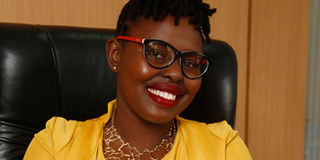My job is to make disadvantaged girls tech-savvy

Miriam Wambui, 26, is the project co-ordinator of Nairobits Trust which equips youth from underprivileged backgrounds with ICT skills. PHOTO | MARTIN MUKANGU
What you need to know:
- I have seen hundreds of girls come and go, and a lot of them leave an impression on me. The one girl that I can’t forget is Whitney. I met her when she was 18. Whitney had a heart problem which meant she would miss class from time to time. Still, she gave it her best shot. Her projects were very out-of-the-box.
- “When I am not working, I like to spend time in the informal settlements, interacting with the residents one-on-one. There are a lot of problems here: there is poverty, early pregnancies and school dropouts. The biggest problems though is lack of opportunities.
“My father died when I was 12. My mother raised my two siblings and I singlehandedly. We lived in an informal settlement. I wanted to become a nurse, but when I couldn’t join the university, I immersed myself in community work. That led to my first encounter with Nairobits as one of their students. I completed the training and went on to get a job. I had made it out, but I just couldn’t forget about the thousands of other girls like me I had left behind.
After a fellowship from Akili Dada, I became the head of the girls-only centres in Nairobits. There are three centres for girls at the moment. Every day at work is a chance to ensure that the girls get ICT skills, get mentored and get sexual health education. My workday starts at 8 am. Two days a week I go out to the field to interact with the girls. This has to be the best part of my week.
LIMITED CLASSES
I have seen hundreds of girls come and go, and a lot of them leave an impression on me. The one girl that I can’t forget is Whitney. I met her when she was 18. Whitney had a heart problem which meant she would miss class from time to time. Still, she gave it her best shot. Her projects were very out-of-the-box. I think she is the embodiment of what I am working hard to achieve. Having someone like her looking up to me keeps me on my toes.
“When I am not with the girls, then I am out looking for funding or partnerships. Ours is a fully donor-funded trust. Getting funds is an uphill task. It also means that we can only take a limited number of students per class, something that the community around us sometimes doesn’t understand. The recruitment process is quite thorough. We use community-based organisations in the informal settlement to pick out the needy girls after which we interview them and select 20 per class.
“When I am not working, I like to spend time in the informal settlements, interacting with the residents one-on-one. There are a lot of problems here: there is poverty, early pregnancies and school dropouts. The biggest problems though is lack of opportunities. Even after we take girls through the programme, they still have to go back to these communities and start on the job hunt which is not easy. What they need is a chance to see how big the world is and how endless the possibilities are. When I’m not out and about, I am a homebody – I love cooking, listening to music and reading. I am currently reading Paulo Coelho’s The Alchemist. He writes about trusting that if you really want something, then the universe will conspire to give it to you.”





